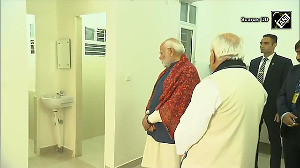Cinderella and the Global Financial Meltdown is not the sort of story you want to tell your children at bedtime. Not because it is frightening, though that it certainly is, but rather because the morality has gone all haywire.
Naturally, the ugly step-sisters, the world's most profligate nations - foulest of them all, the binge-and-barf US - have got their comeuppance. But, unlike in the best fairytales, dutiful Cinderellas - the Asian savers who have sat quietly counting their pennies - have fared even more disastrously. "Diners Club" was always a more potent spell than the phoney "Decoupling".
That is not the worst of it, dear children. More cruel still is the fact that economies whose companies did all they were supposed to do - spend their money on gadgetry and magical labour-saving technology - have been the hardest hit of all.
As Peter Tasker of Dresdner Kleinwort says: "High-value-added manufacturing is to Japan what financial services are to the UK. Both countries have most of their eggs in one basket. When the good times roll, specialisation works beautifully as the high-value-added sector pulls along the less efficient areas of the economy. But the price for high profitability is high volatility."
Japan, a country whose conservative banks were generally too cautious to paddle in the toxic waters of subprime, has fared even worse than the most cavalier of advanced economies.
Output in the fourth quarter shrank an incredible 3.3 per cent. Economists now expect overall contraction of 4 per cent this year in what would be the worst performance since allied bombs destroyed the country's cities at the end of the second world war.
The dire performance is almost entirely linked with the collapse of exports, which fell 35 per cent in December and an astonishing 46 per cent in January. Sure, Japan's free-spending trading partners have suffered. But when they stop consuming, Japan, and others in a similar position, have been hit harder still.
Other lily-white losers include South Korea, Singapore and Taiwan - the latter among the world's worst-performing advanced economies.
Unlike Japan, Taiwan does not have many of its own brands. It supplies the microchips and flat screens that others need to make their famous products. When trade is flowing, it has been an indispensable part of the global supply chain.
But when the end user is broke and trade seizes up, its economy simply grinds to a halt. In the fourth quarter of last year, Taiwan's economy shrank by more than 8 per cent, on a seasonally adjusted basis an annual contraction of more than one-fifth.
It is at times like this that poorer, less sophisticated economies that have committed fewer resources to now-obsolete labour-saving devices breathe a sigh of relief. Workers in China or India can be sent back to their villages, while expensive machinery in other countries remains obstinately in place.
China is expected to grow at between 6 per cent and 8 per cent this year as the government piles billions of dollars into make-work programmes. That is quite a comedown from the 13 per cent growth of 2007, but probably a manageable situation.
Likewise India, another economy where labour plays a disproportionate role, could grow by 7 per cent this year. India is far less dependent on exports than China, though less able than its fiscally stronger rival to crank up domestic demand through big spending.
Still, being dependent on labour carries its own risks, says Takahira Ogawa, of Standard&Poors, the credit rating agency. Unlike machinery labour can grow restless, and even revolt, if it is not gainfully employed. So far, the signs are that both China and India can keep a lid on social unrest. But such calm is not guaranteed to last happily ever after.
Copyright The Financial Times Limited 2009







 © 2025 Rediff.com -
© 2025 Rediff.com -